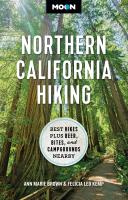11 Gifts for Hikers and Campers
Looking for the perfect present for the outdoor enthusiast in your life? Moon Travel Guides, the publisher leading travelers since 1973, has got your back. Gear up for adventure with these incredible gifts for hikers and campers.
1. A Guidebook
Even the most avid outdoors enthusiast needs a bit of inspiration from time to time, and Moon has options aplenty. Check out the brand-new Moon USA National Parks Hiking below, or choose from one of our other regional camping and hiking guides.
Pick a park, find your trail, and embark on an unforgettable journey in America’s top national parks with outdoors expert Jason Frye.
Featured Titles
2. Darn Tough Socks

There’s nothing worse than a mid-hike blister. Avoid the pain and bandages with these durable, built-to-last socks that regulate temperature, wick moisture, and provide just the right level of cushioning.
3. GoPro HERO Camera

They don’t call it the “official camera of fun” for nothing. The GoPro Hero, now in its twelfth generation edition, is an excellent hiking companion, even for the less tech-savvy: it’s intuitive to use and auto-adjusts for contrast, focus, and color. All you have to do is strap it on and commence documenting adventures.
4. GSI Outdoors Collapsible Coffee Maker

For those of us that require a caffeine fix: this collapsible pour-over coffee maker from GSI Outdoors will give anyone that burst of morning energy needed to start a new day of hiking.
5. Justin’s Nut Butters

These nut butters, which can be purchased in transportable packets, are a perfect stocking stuffer. They’re non-GMO and naturally made from only two ingredients, packing a powerful protein punch when you need a little pick-me-up on the trail.
6. PlatyPreserve Wine Preservation System

Who says you can’t hike and drink at the same time? Okay, maybe not at the same time—but with this lightweight collapsible flask that holds a full bottle and protects wine from oxygen, they’ll have a delicious glass to toast with when they reach their campsite.
7. MSR PocketRocket Travel Stove

This ultralight, compact stove is a backpacking favorite. It boils a liter of water in under 4 minutes, has adjustable flames from simmering to boiling, and is super easy to set up and operate.
8. OtterBox LifeProof Cell Phone Cases

These phone cases are definitely a lifesaver. They come in a variety of styles for Apple, Samsung, and more, and are built to ensure your phone’s safety even in the wildest conditions: they can handle water, mud, snow, and even hard hits when dropped (it’s okay, we all do it).
By clicking 'Sign Up,' I acknowledge that I have read and agree to Hachette Book Group’s Privacy Policy and Terms of Use
9. America the Beautiful National Parks Pass

Give them the gift of nature by… giving them access to it! The National Parks Pass gives them access to more than 2,000 federal recreation sites across the country. More than 80% of the proceeds go directly to causes protecting the parks. The design pictured above is for the 2023 calendar year.
10. SPOT Satellite GPS Messengers

Any seasoned hiker will tell you: safety and preparation are key. These satellite messengers are great if they’re headed out on a backcountry trek where service is spotty: they can use it to reach emergency responders, check in with family and friends, and share GPS coordinates—or just track their adventures!
11. Suunto Core Watch

This altimeter watch means business: its many (many) functions include a temperature gauge, compass, pressure-based altimeter, weather forecast, and ascent/descent rate measurer. It’s also water-resistant up to 30 meters underwater. So it’s basically the outdoor adventurer’s new best friend.
What to read next…
Pin it for later









